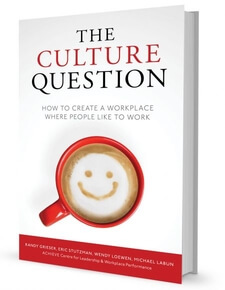Excerpt from The Culture Question:
For a vehicle to do its job, it needs both an engine for power and a steering system so it can be guided. An organization is no different: its purpose is the engine that propels it forward, and its values are the steering system by which it is guided.
Purpose defines why you do what you do, and values define how you act in service of that purpose. Values are a key component of a healthy workplace culture because they clarify how your organization and its staff should behave. They provide the framework within which you can test decisions, accomplish tasks, and interact with others.
Values help organizations determine a range of acceptable behaviors, defining for leaders and employees alike which actions are encouraged and which are unacceptable. Values tell staff what is good for the organization and what is unhealthy. For example, in our own organization we have defined “receptivity to feedback” as a value that is core to our identity. Our collective clarity about this value allows us to more willingly cut ties with contractors or employees who have been unreceptive to feedback even if there are other things we like about them. As a result, we are surrounded by people who are not only easier to work with, but who are also committed to improvement and personal growth.
When organizations explicitly define their true values, they provide immediate clarity for decision making. They provide a reference point in the hiring processes, performance reviews, and any disciplinary actions. An organization’s values create helpful boundaries that show staff and clients where the organization will go and where it won’t go.
We interviewed a senior executive in the financial industry about how values guide her company’s decisions. She said that their values have helped them decide which clients to keep and which to let go. When faced with a client who had engaged in extortion and other unethical business practices, the company decided to end their relationship with that client, even though it had been a large and lucrative business opportunity. She felt that letting the client go was positive for her company because it built the trust of their staff and other clients. By holding firm to their values, they showed everyone that they could be trusted to be ethical.
Another person we interviewed described how several years ago, after much consideration, she resigned from a high-paying job in her fast-paced and demanding industry. The office she worked in had doubled in size, and management was driving for even more growth.
A few years earlier, the company had brought in a new manager to take charge. On arrival he gathered the staff and informed them that he was going to consider who would “make the cut” as suitable for the company’s future. He described staff as “cogs” in the well-oiled machine he intended to create, and he planned to remove any unnecessary parts.
The person we interviewed made the cut, and over the next few years she rose in rank, making more and more money along the way. However, despite having what looked from the outside like the perfect job, she was drained and unfulfilled. She said that the hardest part was showing up day after day to provide an important service for her clients only to be valued by management for her sales figures alone. She quit as a result.
When we spoke with her, she was still in the same industry but working with a different organization. She came to realize that her work satisfaction was intimately tied to her ability to express who she was through her commitment to her clients and the precision in her work. Living her values first was more fulfilling than trying to fit her values into a company’s financial goals.
A good part of people’s well-being at work comes from their ability to act in ways that are congruent with their values. Much like the example above, many people are proficient at and enjoy their tasks, but they are ultimately dissatisfied because their personal values do not align with those of their employer. On the other hand, when an employee’s values are in line with their organization’s values, they may do tasks that aren’t always enjoyable, but they can still be satisfied.
Just as it is important to be able to identify with an organization’s purpose, it is also important to align with its values. Organizations that authentically define their values show employees how to align their behaviors with the things that matter to the organization. They also make it clear where individuals may be out of step with the organization, providing them with an impetus to leave. In either case, defining and communicating values creates clarity for action.
For more FREE RESOURCES on this topic and others, visit our free resources page.
 The Authors
The Authors
This blog is an excerpt from ACHIEVE’s upcoming book, The Culture Question: How to Create a Workplace Where People Like to Work. The authors are four members of ACHIEVE’s leadership team – Randy Grieser, Eric Stutzman, Wendy Loewen, and Michael Labun. The formal release date of the book is March 4, 2019.
However, the book is available for pre-order now.





